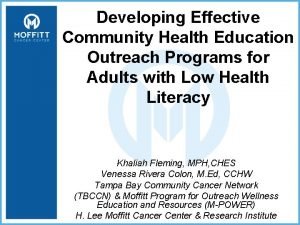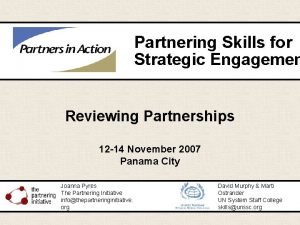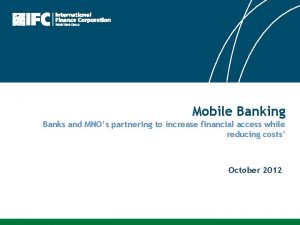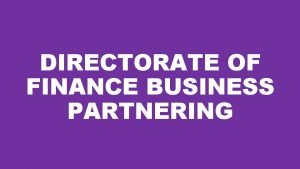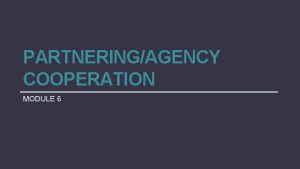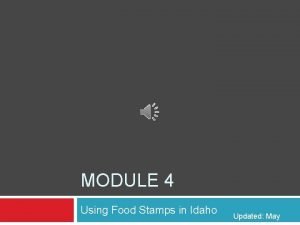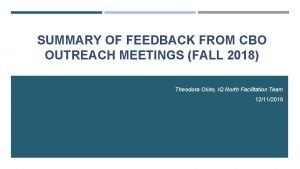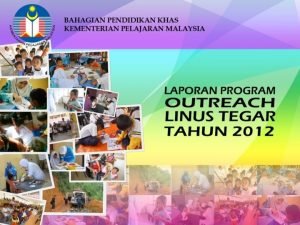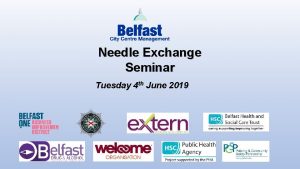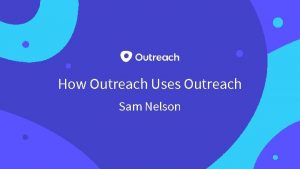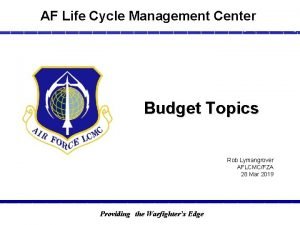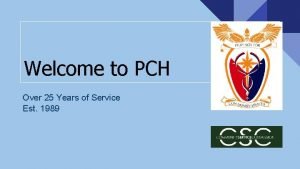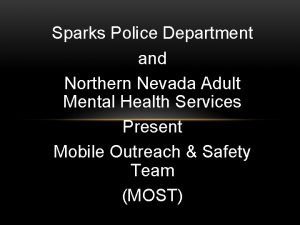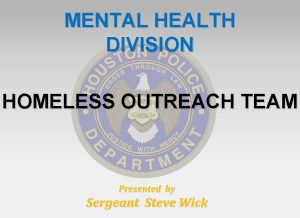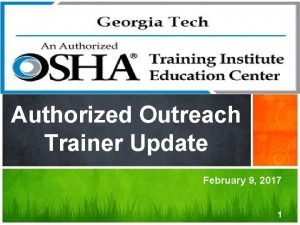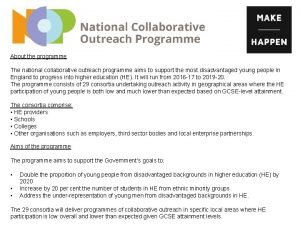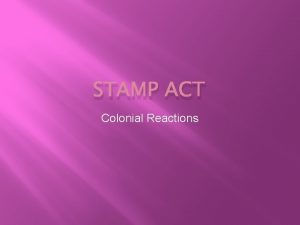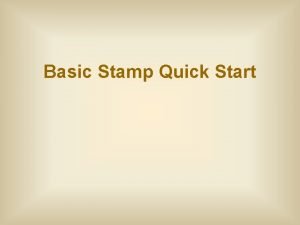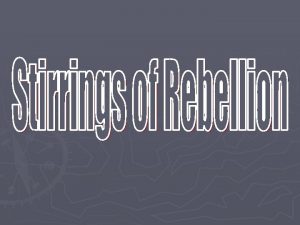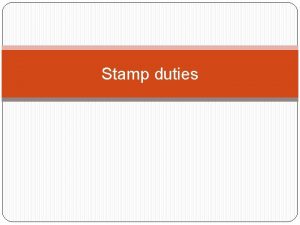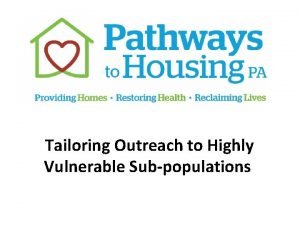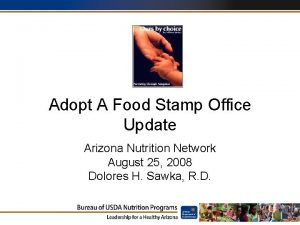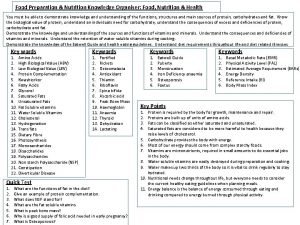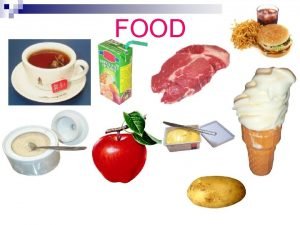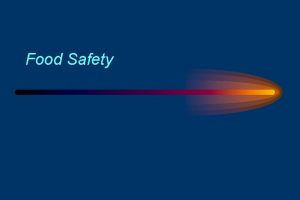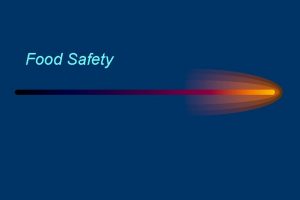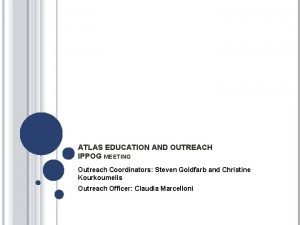Partnering with Food Stamp Outreach and Nutrition Education



















- Slides: 19

Partnering with Food Stamp Outreach and Nutrition Education Programs Ryan Johnson, SNAP-Ed Liaison Shelley Sherman, Extension Educator 2012 ABE Summer Institute August 17, 2012

Minnesota SNAP • Eligibility = 165% of FPG or $36, 878 for a family of four • Average monthly grant = $252/household (2011) • $16 minimum • $668 million in federal funds to MN (2011) • 523, 682 people on SNAP in MN (5/12) • 56% of eligible Minnesotans participate (2010) • Beltrami County = 89% • Blue Earth County = 38% • 45% of eligible seniors (60+) participate • Full participation could bring an additional $75 million dollars to MN Sources: DHS, USDA

MN SNAP Characteristics SNAP Cases (12/11) • 34% = Families with Children • 38% = Disabled Adults • 27% = Other Adults • 16% = Seniors • From 12/10 -12/11, overall participation increased by 11% • Participation has nearly doubled since 12/06 • Fastest growth in the last 6 years has been SNAP-eligible children Source: DHS

MN SNAP (12/06 -12/11) • 600, 000 • 500, 000 • People • 400, 000 • 300, 000 • 200, 000 • 100, 000 • 0 • SNAP Children • SNAP Adults • MFIP Food Children • MFIP Food Adults Source: DHS • Dec 2006 • 72, 519 • 118, 936 • 64, 662 • 25, 557 • Dec 2007 • 80, 088 • 129, 216 • 62, 852 • 24, 772 • Dec 2008 • 94, 621 • 140, 997 • 63, 127 • 25, 160 • Dec 2009 • 130, 008 • 190, 432 • 72, 860 • 27, 678 • Dec 2010 • 159, 781 • 231, 815 • 70, 769 • 29, 796 • Dec 2011 • 182, 602 • 265, 760 • 68, 888 • 28, 609

Recent SNAP Changes • • • Combined Application Form simplified – 2011 Benefits available on EBT card up to 1 year – 2008 6 month reporting – 3/1/09 Benefits increased by 13. 6% ($16 minimum) – 4/1/09 Telephone interviews for eligibility and recertification – 10/15/09 No time limit or work requirements for Able Bodied Adults Without Dependents (ABAWDs) – extended to 9/30/12 Eligibility increased to 165% FPG – 11/1/10 No assets counted or need to be verified – 11/1/10 Expedited SNAP must be issued within 5 working days – 2011 Name changed to SNAP – 2/1/12 Online application (Apply. MN) – 5/12 Source: DHS

Benefits of SNAP For State and Local Communities • Local businesses benefit when SNAP dollars are spent in grocery stores • 80% of benefits are redeemed within 2 weeks; 97% are spent within a month • Every $5 in new SNAP benefits generates $9 in total community spending • Nationwide, at least 8, 900 full-time equivalent jobs are created as a result of SNAP benefits Source: USDA

Benefits of SNAP For Participants • SNAP benefits supplement the budgets of low-income workers so they can stay independent and work toward self-sufficiency. Half of all new participants leave the program within nine months. • SNAP benefits decrease the prevalence of poverty, especially child poverty • Employees whose food needs are met at home have higher productivity and take fewer sick days for themselves and their children Source: USDA

SNAP Outreach 22 Community Action Agencies & hunger relief organizations across Minnesota Goals: • Educate the community • Dispel myths • Provide application assistance • Increase participation, especially among working poor and seniors

SNAP Outreach • Minnesota Food Help. Line (1 -888 -711 -1151) Statewide hotline to help people find food resources and screen for SNAP eligibility • Bridge to Benefits (bridgetobenefits. org) - Online tool to help people find out if they are eligible for SNAP and other public programs • Eat Well to Be Well – Materials to encourage seniors to apply for SNAP

SNAP Marketing Campaign • Public-Private Partnership between General Mills, Hunger Free MN, Hunger Solutions MN, DHS, and USDA • Focus on seniors and newly eligible Jill Hiebert Hunger Solutions Minnesota 651 -789 -9843 jhiebert@hungersolutions. org To order materials: http: //www. nationsprint. com/clients/hungerfreemn/

SNAP Marketing Campaign • Radio Ads and DJ on-air advertising • Bus interior ads • Digital (website) ads • Grocery store receipt ads • Stickers placed on food shelf food • Posters with tear-off pads • Mailing inserts and postcards • Placemats for congregate dining sites • Translated materials are be available

SNAP Education (SNAP-Ed) = Simply Good Eating SNAP-Ed is free nutrition education for SNAPeligible clients. • Teaches the importance of a quality diet • Helps people purchase healthy foods within a limited budget • Teaches how to prepare healthy meals with quick and easy recipes • Encourages a physically active lifestyle • Uses evidence-based, behaviorally-focused curriculum

SNAP Education (SNAP-Ed) The three behavioral outcomes that are encouraged by USDA, Food and Nutrition Service: • Make half your plate fruits and vegetables, eat whole grains, and switch to fat-free or low-fat milk products. • Increase physical activity and reduce time spent in sedentary behaviors. • Maintain appropriate calorie balance during each stage of life—childhood, adolescence, adulthood, pregnancy and breastfeeding and older age.

Why is SNAP-Ed important? • Low-income households have a higher prevalence of health conditions related to poor nutrition than higher income households • Obesity rates have increased the most among the lowest income levels – Obesity puts people at a greater risk for heart disease, hypertension, diabetes and some cancers • Every $1 spent on nutrition education, saves up to $10 in long-term public health care costs • Well nourished children have better school attendance and are more focused on learning • Good nutrition may help older adults remain independent and live in their own homes rather than long-term care facilities Sources: USDA, CDC-National Center for Health Statistics

Why is SNAP-Ed important? “This class has been a great help to me, not only in healthy eating but in using wisdom when grocery shopping as well. Today I eat healthier, with confidence in knowing I’m making good and nutritious choices. I greatly appreciate the encouragement in healthy eating and helping me to incorporate an exercise routine as well. ” - Transitional Housing Program Participant, Clay County

MN SNAP-Ed Providers University of Minnesota Extension (87 counties) – http: //www. extension. umn. edu/Nutrition/contact. html – 612 -625 -7070 Minnesota Chippewa Tribe (6 reservations) – Bois Forte • Theresa Drift (218 -757 -3295) – Fond du Lac • Amber Ahonen (218 -878 -3764) – Grand Portage • Jaye Clearwater (218 -475 -2235) – Leech Lake • Ruby Lowry (218 -335 -4515) – Mille Lacs • Melanie Garbow (320 -532 -7742) – White Earth • Colleen Blattenbauer (218 -983 -3285)

Simply Good Eating Partners Programming is offered in a variety of settings: – – – ABE classes Food shelves Housing providers County Human Services offices Employment Services Providers* Work. Force Centers* Community Action Agencies WIC clinics Senior dining sites Schools Head Start/child care centers Grocery stores *Nutrition education counts as a core activity for MFIP participants

Simply Good Eating (FY 2011) University of Minnesota Extension – – Programming in 87 counties 294, 293 direct contacts with 67, 224 participants 573, 794 indirect education contacts with participants As a result of participation in Simply Good Eating classes: • • 72% of adults (18 -59) report eating more fruits 66% of adults (18 -59) report eating more vegetables 62% of older adults (60+) report eating more fruits 58% of older adults (60+) report eating more vegetables 60% of adults (18 -59) report eating more low and fat-free dairy products 53% of older adults (60+) report eating more low and fat-free dairy products 71% of adults (18 -59) report being more physically active 56% of older adults (60+) report being more physically active

Questions? Ryan Johnson SNAP-Ed Liaison ryan. johnson 1@state. mn. us 651 -431 -3854 Shelley Sherman Extension Educator, West Metro sherm 028@umn. edu 612 -626 -9279
 Cires education and outreach
Cires education and outreach Community health education outreach programs
Community health education outreach programs Partnering to build customer relationships
Partnering to build customer relationships The partnering initiative
The partnering initiative Mnos partnering
Mnos partnering Lorna maden
Lorna maden What is partnering
What is partnering Partnering session
Partnering session Idaho quest card balance
Idaho quest card balance Theodora okiro
Theodora okiro Program outreach pemulihan khas
Program outreach pemulihan khas Drug outreach team belfast
Drug outreach team belfast Sam nelson content
Sam nelson content Nesac outreach facility
Nesac outreach facility Afman 65-605
Afman 65-605 Pch outreach program
Pch outreach program Sparks police report
Sparks police report Hpd mental health division
Hpd mental health division Georgia tech osha outreach portal
Georgia tech osha outreach portal National collaborative outreach programme
National collaborative outreach programme

